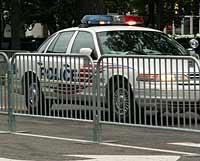Four security officers murdered in protest over Freeport mine in Papua province
Four security officers were hacked to death by protesters demanding the closure of a U.S.-owned gold mine in Papua province Thursday, police and witnesses said. At least 27 people were injured in clashes.

It was the third day of violent demonstrations against the mine run by Freeport-McMoRan Copper & Gold Inc. The killings are certain to sharply raise tensions in the region, which is also home to a separatist rebellion.
"The killers are no longer human beings," said police spokesman Col. Kertono Wangsadisastra. "They went wild."
Hundreds of protesters blockaded the road outside a university in the provincial capital Thursday demanding the government close the gold mine, said to be the world's largest. Riot police tried to break up the rally with tear gas and baton charges, but the rock-hurling students refused to move.
Several security officers shot at protesters, though police Lt. Col. Paulus Waterpauw claimed they were firing rubber bullets or blanks.
He said some of the demonstrators ran down three policeman and a soldier _ bludgeoning them to death with rocks and knives. The bodies of two of the victims were then covered with charred wood, prompting several police to say initially that they were set on fire.
"At first we thought that was the case, but no, they were all stabbed and beaten to death," said Wangsadisastra.
Hospitals said at least 19 police and eight protesters were injured in the melee.
The mine is often held up by separatists as a symbol of the unfair division of resources between the capital and Papua, and President Susilo Bambang Yudhoyono warned Thursday that it appears some people are trying to manipulate anger over Freeport into a push for independence.
There have been several protests in recent weeks, including one on the road leading to the mine that forced it to temporarily suspend operations, costing the New Orleans-based company millions of dollars.
"We want Freeport to close because it has not given any benefits to the people of Papua, in fact it's made them suffer," said protester Kosmos Yual.
Sporadic clashes continued throughout the afternoon, with gun shots repeatedly heard across the city, but by night fall the blockade had been lifted and a tense calm restored.
"The situation is under control," national police chief Gen. Sutanto, who goes by only one name, told reporters after a Cabinet meeting in the capital Jakarta. "Now we will let the legal process take its course."
Ten people have been arrested, but those involved in Thursday's killings fled into a nearby jungle, police said.
Freeport defends its operations in the highlands of Papua, saying it pays millions of dollars in taxes each year and funds scores of community projects close to the mine.
President Yudhoyono said demands to close Freeport were unrealistic, but that the government would study Freeport 's development program to see if the "funds could be distributed more evenly."
He also reiterated that Papua was an integral part of Indonesia that would never be given independence.
Papua's separatist movement has been brutally repressed by Indonesian security forces.
Foreign journalists are banned from the region, some 3,700 kilometers (2,300 miles) east of Jakarta .
Unlike Indonesia 's mainly Malay inhabitants, Papuans are ethnic Melanesians. Most Indonesians are Muslims, but Papuans are Christians or animists.
The eastern part of the island forms Papua New Guinea , reports the AP.
D.M.
Subscribe to Pravda.Ru Telegram channel, Facebook, RSS!


